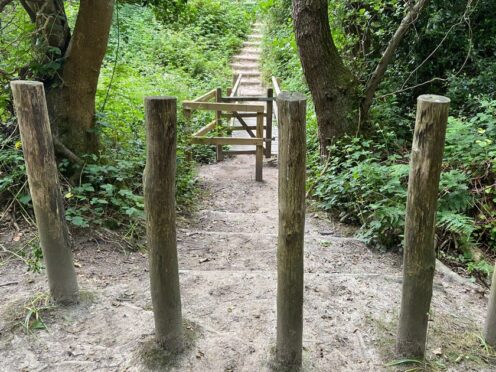
Campaigners are calling for England’s path network to be made more inclusive after research found that steps, stiles and gates can be an obstacle for many people.
The Ramblers, Britain’s walking charity, is urging the Government to remove all unnecessary physical barriers from paths within the next five years to ensure nature is accessible for all.
The charity said wheelchair users, people with physical disabilities, those with poor mobility, the elderly, people with pushchairs and even dog walkers with less athletic pets can struggle on poorly designed paths.
Other barriers include blocked or badly maintained paths as well as a lack of public toilet facilities and seating, the campaigners added.

It comes after a survey of more than 4,800 UK adults found that a quarter of people (25%) said physical barriers stop them from using the paths network.
But this rose to 56% of those surveyed with physical and sensory disabilities, according to the poll carried out by YouGov on behalf of the charity.
The survey also found that 87% of the respondents in this group agreed that the path network is a national asset while 92% said it should be protected for future generations.
However, more than half said they did not feel welcome when using public rights of way.
Elsewhere, the Ramblers cited research from Natural England that found more than 20% of England’s population are currently unable to make full use of public rights of way because of mobility issues – approximately 11 million people.
David Weir, six-time Paralympic gold medallist, who is backing the call for change, said: “Having the ability to access nature on my doorstep makes a big difference to my mental wellbeing, as well as providing some active recovery when I’m not training.

“Through experiencing what accessibility is like in different countries across the world, I can say that the UK is one of the strongest.
“However, it’s clear that we still have a way to go, especially in aspects such as making our path network more accessible and useable for those with disabilities.
“If more people are able to get outside and get active in nature, the knock-on effect for our physical and mental health will be huge.”
The research comes as the Ramblers launched their Outdoors Unlocked campaign, which is calling on the next government to break down the barriers currently standing in the way, ahead of the general election expected this year.
As part of the campaigner, the charity is calling for new legislation that will help deliver on the current UK government’s pledge to make sure everyone can access green space within a 15-minute walk.
Jack Cornish, head of paths at the Ramblers, said: “We are committed to improving access to the outdoors for everyone in society, and to making our path network inclusive, safe, and useable; ensuring that everybody in England, no matter who they are or what their circumstances, can get outdoors and connect with nature as part of their daily lives.
“But we can’t do this alone. The UK government needs to support this vital and cherished part of our infrastructure by strengthening equalities legislation to reduce obstructions for disabled people and supporting local authorities to invest more time and money to make our paths more accessible.”
A Defra spokesperson said: “We are creating more opportunities for people to access nature and spend time outdoors in our countryside – it’s why we have set out our ambition for every household to be within 15 minutes of a green space or water.
“This is especially important for disabled people and we have taken steps to reduce barriers preventing people from accessing green and blue spaces, including through our £16 million ‘Access for All’ programme.
“More than £3.5 million has already been spent on resurfacing paths, replacing stiles with accessible gates and the provision of new all-terrain trampers.”

Enjoy the convenience of having The Sunday Post delivered as a digital ePaper straight to your smartphone, tablet or computer.
Subscribe for only £5.49 a month and enjoy all the benefits of the printed paper as a digital replica.
Subscribe